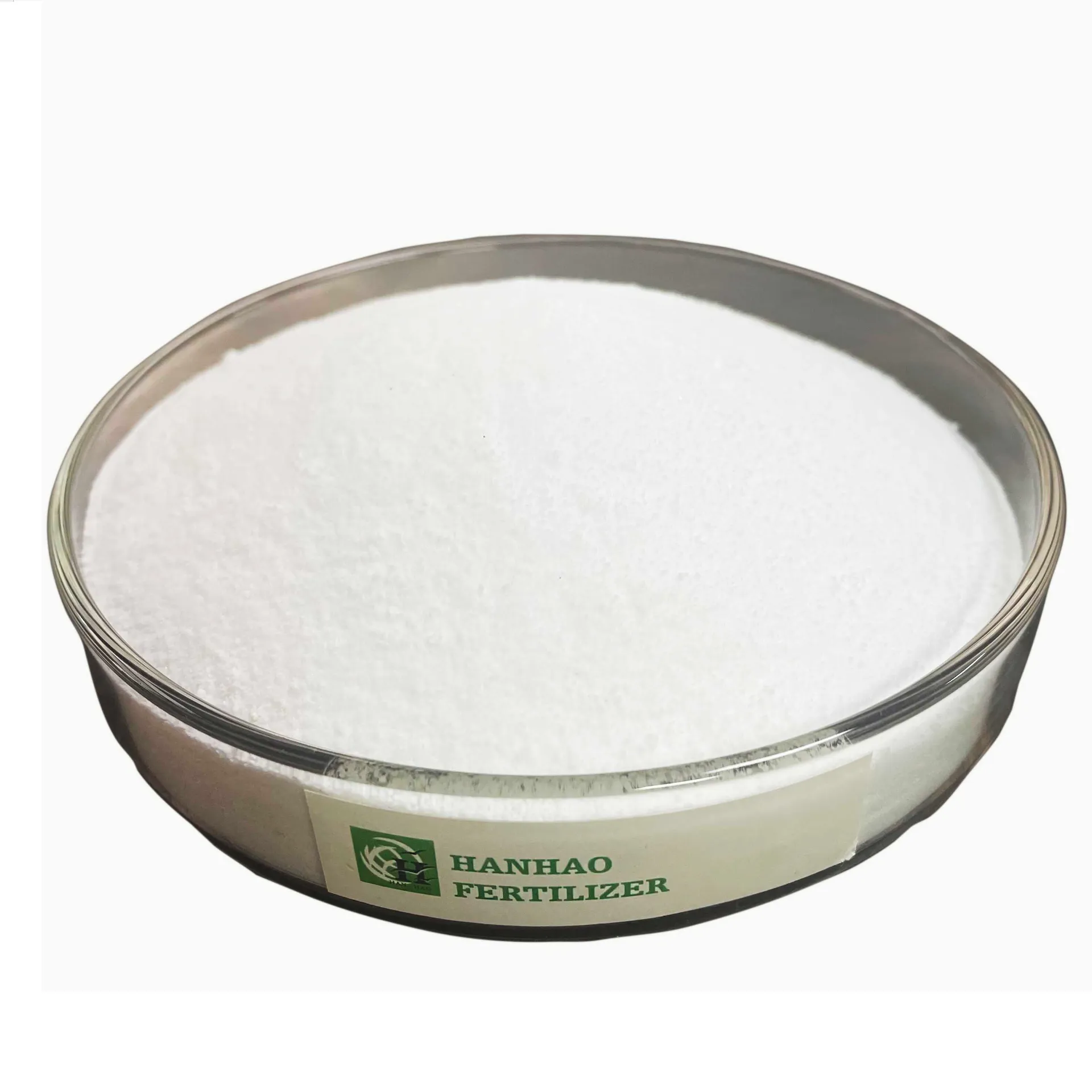
Nov . 26, 2024 10:09 De volta à lista
The Science Behind Sulphate of Potash and Its Effect on Crop Quality
Sulphate of Potash (SOP) is a widely used fertilizer that provides essential nutrients to crops, specifically potassium and sulfur. It plays a critical role in improving crop quality and yield, particularly for high-value crops like fruits, vegetables, and flowers. Unlike Muriate of Potash (MOP), which contains chloride, SOP is a chloride-free fertilizer, making it a superior option for many crops sensitive to chloride. Understanding the science behind SOP’s composition and its effects on plant health can help farmers optimize its use to boost both the quantity and quality of their harvests.

What is Sulphate of Potash?
Sulphate of Potash (K₂SO₄) is a water-soluble fertilizer that contains two essential nutrients: potassium (K) and sulfur (S). Potassium is a macronutrient required by plants in large amounts, while sulfur, although needed in smaller quantities, is also vital for plant growth. SOP is produced by refining naturally occurring potash minerals or from sulfate deposits, and it is known for being free from chloride, unlike Muriate of Potash (MOP), which contains chloride.
The presence of sulfur in sop potassium further distinguishes it from other potash fertilizers, making it especially valuable for crops that require both potassium and sulfur for optimal growth and quality. The composition of SOP directly impacts its effect on plant development, nutrient uptake, and overall crop quality.
The Role of Potassium in Plant Growth and Quality
Potassium is one of the three primary macronutrients plants need to grow, alongside nitrogen and phosphorus. It plays a crucial role in regulating various physiological processes, from water and nutrient uptake to enzyme activation and photosynthesis. Potassium is integral to several key plant functions, including:
Water Regulation: Potassium helps regulate the opening and closing of stomata, which controls water loss through transpiration. This is especially important during drought or heat stress, as it helps maintain the plant's water balance.
Sugar and Starch Synthesis: Potassium is involved in the synthesis of sugars and starches, which are essential for fruit and vegetable development. This leads to improved size, flavor, and overall quality of crops like tomatoes, grapes, and carrots.
Photosynthesis and Energy Production: Potassium is essential for the synthesis of ATP (adenosine triphosphate), which is the energy currency of the cell. Efficient photosynthesis, facilitated by potassium, directly impacts plant growth and productivity.
By providing potassium through SOP, farmers ensure that plants can carry out these essential processes more effectively, resulting in healthier plants and better-quality crops.
The Role of Sulfur in Plant Health and Quality
Sulfur, though required in smaller amounts compared to potassium, is equally important for plant health. It is a key component of amino acids, proteins, and vitamins that are essential for plant growth and development. Sulfur also plays a significant role in the synthesis of chlorophyll, the pigment responsible for photosynthesis, and contributes to the formation of oils, essential for the development of many crops, including oilseeds.
One of the primary functions of sulfur is its involvement in the formation of proteins and enzymes, which regulate plant metabolism. Sulfur also aids in nitrogen metabolism, making nitrogen more available for plant uptake and enhancing nitrogen-use efficiency. This means that plants receive the benefits of both potassium and sulfur when sop potassium sulphate is applied, allowing for balanced nutrition and improved crop quality.
For crops like garlic, onions, and brassicas, sulfur is crucial in the development of flavor and aroma, which are key quality attributes in the food industry. In general, sulfur helps improve the taste, texture, and nutritional value of fruits, vegetables, and herbs, making SOP an important fertilizer for high-value crops.
Chloride-Free Advantage for Sensitive Crops
One of the key advantages of using SOP over MOP is its chloride-free nature. Many high-value crops are sensitive to chloride, and excessive chloride in the soil can lead to toxicity, reduced growth, and poor-quality produce. For crops like grapes, citrus fruits, and certain vegetables, chloride can cause damage to the roots, hinder nutrient uptake, and reduce yield.
SOP’s chloride-free formulation ensures that it can be safely used on these sensitive crops without the risk of chloride-induced harm. This makes SOP particularly beneficial for growers of high-value, chloride-sensitive crops, allowing them to improve both the quantity and quality of their produce without compromising plant health.
Impact of SOP on Crop Yield and Quality
When applied to crops, SOP significantly improves both yield and quality. The nutrients it provides—potassium and sulfur—are critical for enhancing plant metabolism, growth, and resistance to stress. For example, in fruit crops, SOP helps to increase fruit size, color, and flavor by promoting proper sugar and starch production, improving photosynthesis, and supporting the formation of oils and acids.
In addition to improving the appearance and taste of produce, SOP also enhances crop resilience to environmental stresses. Potassium plays an essential role in helping plants adapt to drought, heat, and salinity, which are becoming increasingly common in many parts of the world due to climate change. By improving the plant's ability to manage stress, SOP ensures that crops can maintain high-quality yields even under less-than-ideal growing conditions.
-
Organic Pepper Fertilizer – Sustainable Growth for Healthier Crops and Soils
NotíciasNov.25,2025
-
Sustainable Growth with Organic Phosphate Fertilizer | Benefits & Innovations
NotíciasNov.24,2025
-
Organic Phosphorus and Potassium Fertilizer: Sustainable Soil Nutrition & Global Impact
NotíciasNov.24,2025
-
Organic Phosphorus Fertilizer: Sustainable Nutrient Solutions for Modern Agriculture
NotíciasNov.23,2025
-
Sustainable Growth with Organic Phosphorus Plant Fertilizer | HH Fertilizer
NotíciasNov.23,2025
-
Organic Plant Meal Fertilizer for Sustainable Agriculture – Benefits & Innovations
NotíciasNov.22,2025
